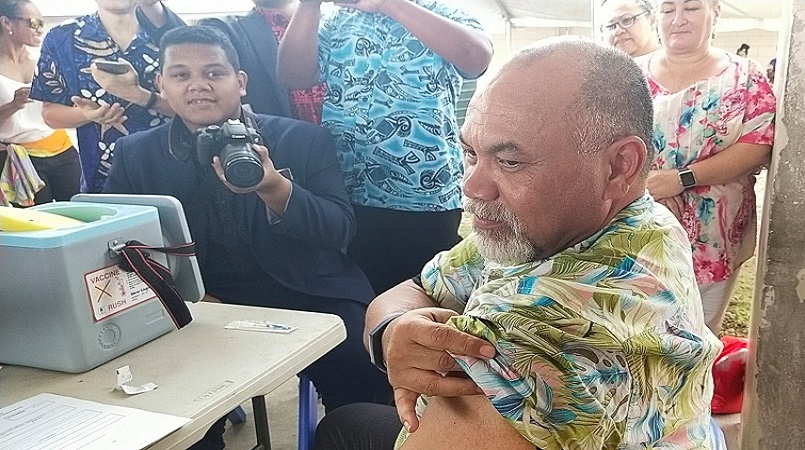
The full roll-out of the Covid-19 vaccination programme will continue this week in Nauru.
Phase one (for the first dose) has a four-week schedule.
The President's weekely update said all 7000 adults are expected to have received their first dose in this time.
The second dose will be administered from mid-June to early-July.
However, President Lionel Aingimea said some people will not receive the vaccine such as pregnant and breastfeeding mothers, and others that may have certain allergies or specific medical conditions.
Nauru launched its Covid-19 Vaccination Programme last Friday with its leaders among the first 100 to receive the first of two doses of the COVAX AstraZeneca vaccine.
Nauru received a donation of 10,000 doses of the vaccine from the Government of India last Thursday.
The President and Health Minister Isabella Dageago expressed gratitude to the Government and people of India for the generous donation as well as others that have worked in the background to secure this second consignment for Nauru.
The India donation now ensures 100 per cent immunisation coverage of the adult population of Nauru including expatriate workers on island.
On 1 April, Nauru received the first delivery of 7200 doses, which now brings the total to 17,200 doses. This means the adult population of 7,000 can be fully vaccinated by early July; possibly making Nauru the first to vaccinate its adult population.
“We’ve kept Covid out, by the grace of God, and again by the grace of God we’re getting all our adults vaccinated,” President Aingimea said.
The President adds that given the earlier than expected delivery of the vaccine to Nauru, combined with a short shelf life, meant a review of the roll-out program was needed to bring forward vaccination yet keeping within the World Health Organisation’s (WHO) recommendations and guidelines for administering the two doses.
Experts advise that while the first dose provides protection, the second dose is necessary to give the highest level of immunity and protection.
The President said although Nauru is receiving the vaccines from two different countries, there is no difference other than the packaging and labelling.
Both batches of the vaccine that Nauru has received were designed and created by a team at Oxford University who entered into an arrangement with AstraZeneca Pharmaceuticals; who then licenced SK Bio in Korea and the Serum Institute of India to manufacture the vaccine.
The World Health Organisation, the COVAX Facility and other expert advice confirms that both vaccines are exactly the same and are fully interchangeable.
Nauruans will be scheduled to receive their vaccine based on the Electoral roll by districts. A vaccine database will be created for this.
As people generally know which roll they are on, this will be easier to schedule people to get their vaccines.
The Department of Justice is working on capturing expat workers to also include in the database.
Getting vaccinated provides protection for yourself, your family and the community at large. It could also enable you to travel when borders reopen as some countries may require international travelers to be vaccinated before entering their country.
As of 4 April 2021, WHO data states that a total of 604,032,357 vaccine doses have been administered. Fiji has delivered 6,278 doses.
At this time, WHO considers that the benefits of the AstraZeneca vaccine outweigh its risks and recommends that vaccinations continue.
Photo supplied Nauru Health Caption: President Lionel Aingimea receives the first dose of the AstraZeneca vaccine
